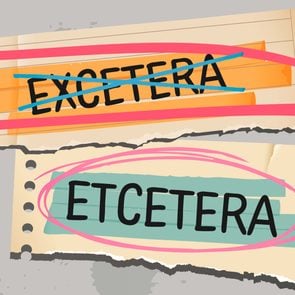Dictionary Editors Say This Is the Most Misused Word in the English Language
Updated: Jul. 16, 2021

It's literally the opposite of what you'd expect.
A traffic jam when you’re already late.
A free ride when you’ve already paid.
The fact that the King James Bible is the most shoplifted book in the United States.
One of these three things is an example of irony—the reversal of what is expected or intended. The other two (no offense to Alanis Morissette) are not. The difference between them may be one of the most rage-inducing linguistic misunderstandings you’re likely to read about on the Internet or hear about from the determined grammar nerds in your life. “Ironic” does not, technically, mean “unfortunate,” “interesting,” or “coincidental,” despite these terms often being used interchangeably. And that frequent misuse has not escaped linguists; according to the editors at Dictionary.com, “We submit that ironic might be the most abused word in the English language.”
That’s a tough claim to prove, but it’s clear that confusion over the definition of irony is persistent, and decades old. “Irony” makes Harvard linguist Steven Pinker’s list of the 58 most commonly misused words in English, and ranks in the top 1 percent of all word lookups on Merriam-Webster’s online dictionary. Even Great Gatsby author F. Scott Fitzgerald got it wrong, some say, when he claimed in 1939, “It is an ironic thought that the last picture job I took yielded me five thousand dollars five hundred and cost over four thousand in medical attention.” That’s not ironic, but these 25 funny examples of irony in real life are.
So what does irony mean, really, and where does the confusion come from? Part of the ambiguity probably stems from the fact that there are no fewer than three definitions of irony depending on which dictionary you use. There’s Socratic irony (an ancient rhetorical move), and dramatic irony (an ancient theatrical move), but the definition of irony we care about—and the kind that’s most bitterly debated—is situational irony. Situational irony occurs when, as the Oxford English Dictionary defines it, “a state of affairs or an event… seems deliberately contrary to what one expects and is often wryly amusing as a result.” If you’re still confused, just use this special irony punctuation mark and call it a day.
The trick, according to purists, is the deliberately contrary part—for a situation to be ironic, it must be the opposite of what is expected, not merely an amusing coincidence. A traffic jam when you’re already late may be an undesirable coincidence, but it is not the opposite outcome one would expect when leaving for work late (especially if that person lives in a major city). In an article titled Lines From Alanis Morissette’s “Ironic,” Modified to Actually Make them Ironic, College Humor writer Patrick Cassels corrects the situation like this: “A traffic jam when you’re already late… to receive an award from the Municipal Planning Board for reducing the city’s automobile congestion 80 percent.” Now that’s irony.
Not every linguist goes by this limited view, though. Ever the champions of fluid language growth, Merriam Webster argues that Mr. Fitzgerald, Ms. Morissette, and anyone else who uses “ironic” to mean “coincidental” isn’t actually wrong, but is actually just trailblazing. “The word irony has come to be applied to events that are merely curious or coincidental,” the editors write, “and while some feel this is an incorrect use of the word, it is merely a new one.”
Now isn’t that ironic something? Learn how to fix these other 12 grammatical errors even smart people make.


